Jeep Avenger vs Vauxhall Rocks Electric – Differences & prices compared
Compare performance, boot space, consumption and price in one view.
Find out now: which car is the better choice for you – Jeep Avenger or Vauxhall Rocks Electric?
The Jeep Avenger (SUV) comes with a Electric, Petrol or Petrol MHEV engine and Automatic or Manuel transmission. In comparison, the Vauxhall Rocks Electric (Hatchback) features a Electric engine with Automatic transmission.
When it comes to boot capacity, the Jeep Avenger offers 380 L, while the Vauxhall Rocks Electric provides 63 L – depending on how much space you need. If you’re looking for more power, decide whether the 156 HP of the Jeep Avenger or the 8 HP of the Vauxhall Rocks Electric suits your needs better.
In terms of consumption, the values are 15.50 kWh4.90 L per 100 km for the Jeep Avenger, and for the Vauxhall Rocks Electric.
Price-wise, the Jeep Avenger starts at 21900 £, while the Vauxhall Rocks Electric is available from 6800 £. Compare all the details and find out which model fits your lifestyle best!
Jeep Avenger
The Jeep Avenger is a compact SUV that brings a blend of rugged design and modern technology, making it ideal for both urban and off-road adventures. Its robust build and distinctive styling capture Jeep's iconic spirit while offering a comfortable and refined driving experience. With advanced safety features and a versatile interior, the Avenger caters to a wide range of drivers looking for practicality and excitement.
details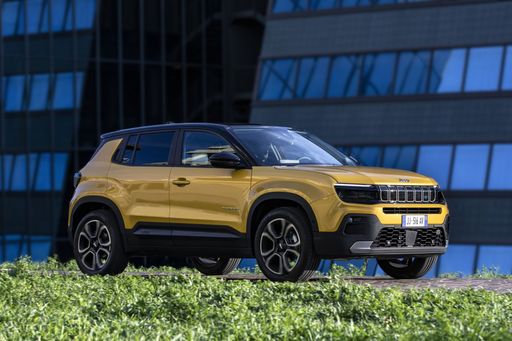 @ Stellantis
@ Stellantis
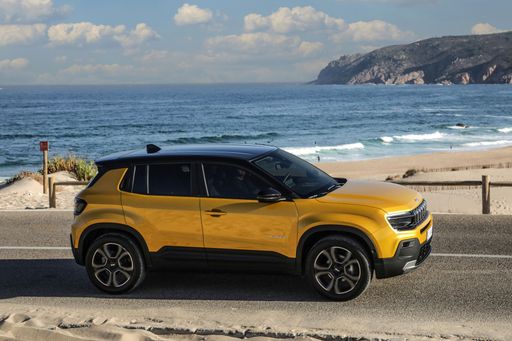 @ Stellantis
@ Stellantis
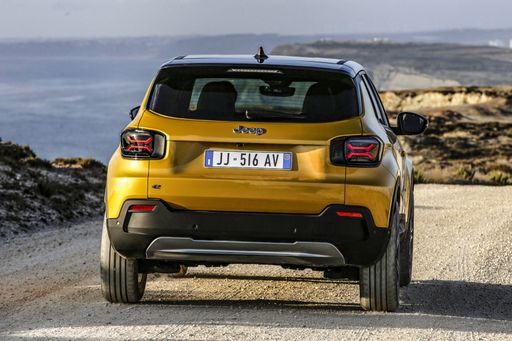 @ Stellantis
@ Stellantis
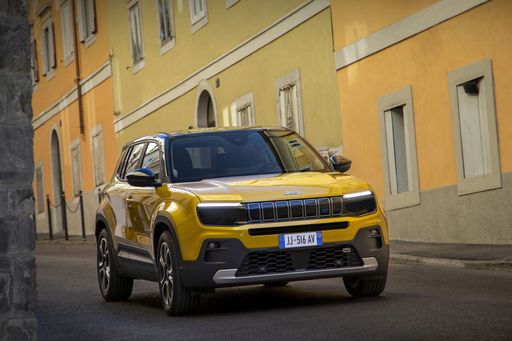 @ Stellantis
@ Stellantis
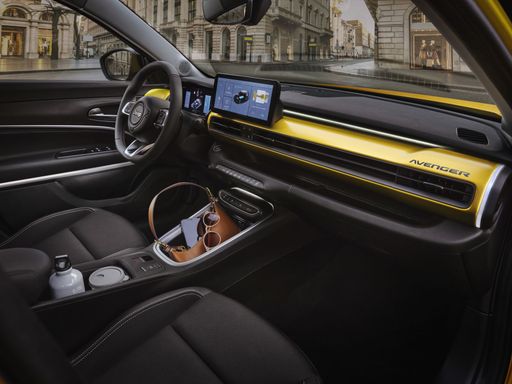 @ Stellantis
@ Stellantis
Vauxhall Rocks Electric
The Opel Rocks Electric stands out as a stylish and compact solution for urban mobility, offering both convenience and an eco-friendly commute. Its sleek design and vibrant colour options make it an attractive choice for those looking to navigate city streets with ease. This nimble vehicle not only promises a smooth ride but also enhances the overall urban driving experience.
details

|
|
|
|
|
Costs and Consumption |
|
|---|---|
|
Price
21900 - 36900 £
|
Price
6800 - 7500 £
|
|
Consumption L/100km
4.9 - 5.7 L
|
Consumption L/100km
-
|
|
Consumption kWh/100km
15.50 kWh
|
Consumption kWh/100km
-
|
|
Electric Range
400 km
|
Electric Range
75 km
|
|
Battery Capacity
51 kWh
|
Battery Capacity
5.40 kWh
|
|
co2
0 - 129 g/km
|
co2
0 g/km
|
|
Fuel tank capacity
44 L
|
Fuel tank capacity
-
|
Dimensions and Body |
|
|---|---|
|
Body Type
SUV
|
Body Type
Hatchback
|
|
Seats
5
|
Seats
2
|
|
Doors
5
|
Doors
2
|
|
Curb weight
1180 - 1520 kg
|
Curb weight
558 kg
|
|
Trunk capacity
325 - 380 L
|
Trunk capacity
63 L
|
|
Length
4084 - 4088 mm
|
Length
2410 mm
|
|
Width
1776 mm
|
Width
1388 mm
|
|
Height
1527 - 1541 mm
|
Height
1525 mm
|
|
Payload
494 - 502 kg
|
Payload
142 kg
|
Engine and Performance |
|
|---|---|
|
Engine Type
Electric, Petrol, Petrol MHEV
|
Engine Type
Electric
|
|
Transmission
Automatic, Manuel
|
Transmission
Automatic
|
|
Transmission Detail
Manual Gearbox, Dual-Clutch Automatic
|
Transmission Detail
Reduction Gearbox
|
|
Drive Type
Front-Wheel Drive, All-Wheel Drive
|
Drive Type
Front-Wheel Drive
|
|
Power HP
100 - 156 HP
|
Power HP
8 HP
|
|
Acceleration 0-100km/h
9 - 10.6 s
|
Acceleration 0-100km/h
-
|
|
Max Speed
150 - 194 km/h
|
Max Speed
45 km/h
|
|
Torque
205 - 260 Nm
|
Torque
40 Nm
|
|
Number of Cylinders
3
|
Number of Cylinders
-
|
|
Power kW
74 - 115 kW
|
Power kW
6 kW
|
|
Engine capacity
1199 cm3
|
Engine capacity
-
|
General |
|
|---|---|
|
Model Year
2023 - 2025
|
Model Year
2025
|
|
CO2 Efficiency Class
A, D, C
|
CO2 Efficiency Class
A
|
|
Brand
Jeep
|
Brand
Vauxhall
|
Jeep Avenger
Unveiling the Jeep Avenger: A New Era of Innovation
The Jeep Avenger marks a significant milestone in automotive evolution, blending ruggedness with modern-day advancements. Established within the SUV category, the Avenger offers an eclectic mix of powertrains, including electric and hybrid options, catering to the diverse requirements of the modern motorist.
Powertrain Options: Efficiency Meets Performance
The Jeep Avenger presents multiple powertrain configurations, each designed to harmonise performance with efficiency. The electric version boasts a formidable 156 PS and a battery capacity of 51 kWh, enabling a remarkable 400 km of electric range. This places it at the forefront of environmentally friendly travel with a consumption of merely 15.4 kWh/100km.
Additionally, for those favouring classic combustion engines, the 1.2 e-Hybrid and the purely petrol 1.2 GSE T3 offer 100 PS and incorporate innovative mild-hybrid technology to enhance fuel efficiency while maintaining a spirited driving experience.
Advanced Engineering: Technology and Design
At the heart of the Jeep Avenger lies a well-engineered chassis, tailored for both agility and comfort. Measuring 4084 mm in length, 1776 mm in width, and up to 1534 mm in height, the Avenger ensures ample space within a compact footprint, ideal for urban manoeuvrability.
The vehicle supports its robust engineering with meticulous design details, from its substantial boot capacity of up to 380 litres to its five-door configuration, seamlessly blending functionality with aesthetic appeal.
Driving Dynamics and Performance
Front-wheel drive ensures that the Avenger's power is perfectly harnessed for both city streets and off-road trails. The vehicle's acceleration capabilities vary between 9 and 10.9 seconds from 0-100 km/h, a testament to its spirited performance ethos. With a maximum speed ranging up to 184 km/h, the Avenger is built to deliver thrilling drives.
Sustainability at the Forefront
As a reflection of Jeep's commitment to sustainability, the Avenger achieves commendable CO2 efficiency ratings spanning classes A to D. The electric model stands out with zero emissions, while hybrid options offer competitive CO2 figures, appealing to eco-conscious drivers.
Pricing and Trim Levels
The Jeep Avenger is strategically priced between 25,000 and 43,500 €, ensuring accessibility for a broad range of customers. With available trim levels such as Longitude, Altitude, and Summit, prospective buyers can tailor their vehicles to suit individual preferences, choosing from different feature sets and functionalities.
Conclusion: The Jeep Avenger's Promise
The Jeep Avenger is not just a new vehicle; it embodies a shift towards innovative, efficient, and dynamic motoring. By merging advanced technology with Jeep's legendary prowess, the Avenger is poised to redefine expectations within the SUV sector, offering both cutting-edge performance and unyielding reliability.
Vauxhall Rocks Electric
Introducing the Opel Rocks Electric
The world of electric mobility continues to expand with innovative vehicles, and the Opel Rocks Electric is at the forefront of this evolution. Embracing a sustainable future, this compact urban mobility solution combines distinctive styling with practical features, appealing particularly to city dwellers seeking an efficient and environmentally friendly mode of transportation.
Distinctive Design and Dimensions
Measuring just 2410 mm in length, 1390 mm in width, and 1520 mm in height, the Opel Rocks Electric boasts a compact design that makes navigating through narrow city streets a breeze. Despite its diminutive size, it offers a surprising amount of space with a clever two-seater configuration. The vehicle’s quirky and modern appearance clearly distinguishes it from conventional cars, while the available Klub and Tekno trims tailor its aesthetic to match individual preferences.
Technical Brilliance of Electric Power
Under the hood, the Opel Rocks Electric prioritises eco-friendliness with a completely electric powertrain. The battery capacity of 5.4 kWh powers an 8 PS (6 kW) motor, which delivers a maximum torque of 40 Nm. This configuration is ideal for urban environments, providing sufficient punch for everyday city commutes while maintaining energy efficiency.
Range and Efficiency
The vehicle’s electric range is rated at 75 km on a full charge, making it perfect for short daily trips or running errands around the city. With a top speed restricted to 45 km/h, this car falls into the light four-wheeler category, granting road use eligibility for certain groups, such as young drivers.
Comfort and Practicality
The innovative design extends beyond functionality to include comfort and convenience. The two-seat configuration offers ample space for driver and passenger, and with a boot capacity of 63 litres, there’s room for essentials and shopping bags. Additionally, its lightweight architecture, with a kerb weight of 471 kg, enhances efficiency and agility.
Safety and Sustainability
The Opel Rocks Electric’s commitment to sustainability and safety is evident in its design and operation. It achieves a commendable CO2 efficiency class of A and produces zero emissions, aligning with global efforts to combat climate change. This electric mobility solution is as kind to the planet as it is to the wallet, with an attractive price range of €8,340 - €9,140.
Conclusion
The Opel Rocks Electric represents a bold step forward in urban transportation, blending sustainable technology with convenience. For those seeking an eco-friendly, efficient, and stylish way to move around the city, this electric car is an excellent choice, reflecting Opel's dedication to innovation in mobility.
The prices and data displayed are estimates based on German list prices and may vary by country. This information is not legally binding.
